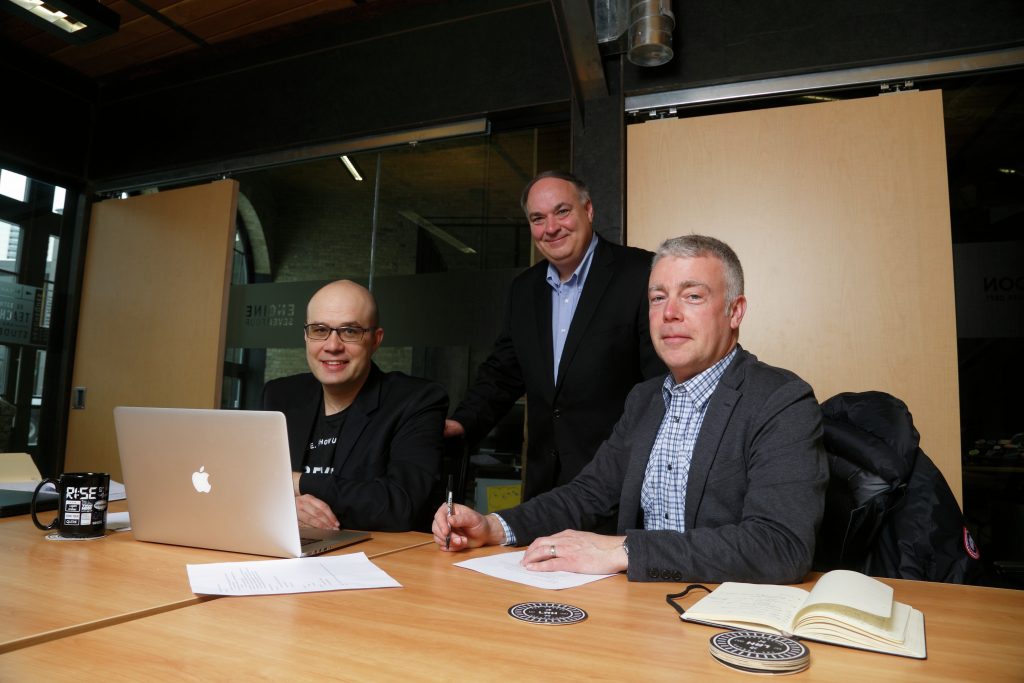Built to Scale
A troika of successful tech founders introduces a for-profit
accelerator program for early stage ventures
Photo: From left, David Billson, Joe Dales and Brian Foster, founders of RH Accelerator Inc.
LAUNCHING A NEW business, particularly in the tech industry, isn’t the easiest thing to pull off these days.
This reality is one David Billson, Brian Foster and Joe Dales know all too well, and is why the trio have decided to combine their collective experience and extensive personal and professional networks into a new initiative designed to provide early stage ventures with support and funding.
RH Accelerator Inc. is a for-profit, community-based initiative designed to bring together interested stakeholders to build new companies.
High potential entrepreneurs will be able to access investors, mentors, suppliers and other stakeholders to help accelerate their businesses.
“I think each one of us has a different lens or interest we bring, but the common core value is we really want to see entrepreneurs be successful building their businesses here in London,” says Billson, CEO of rTraction Inc. “Each of the three of us have built businesses in London and had some success, but we recognize there is a significant gap in the ecosystem.”
An example of Billson’s hopes can be found in the experience of Foster, CEO and co-founder of InnoSoft, who built up his company over 15 years before successfully selling it.
“The three of us have followed different paths, although parallel in some ways. Not only is our network quite extensive, but our experience is extensive as well” —Brian Foster
The hope, Billson adds, is RH Accelerator can bring that timeframe down to seven to 10 years.
For Foster, the concepts bounced around by the three friends have been part of a conversation he’s been having for a long time now.
“It’s cliché to say, ‘If I only knew then what I know now’. How do we translate that into helping companies succeed in London and area?” Foster says. “The three of us have followed different paths, although parallel in some ways. Not only is our network quite extensive, but our experience is extensive as well.”
With that in mind, the accelerator will have three specific legs to its system.
The partners have a network of mentors, people who are giving their time and energy to help these companies succeed. They will facilitate and broker those relationships.
Next is the investor network, and the thought is if the accelerator partners like a company and are invested in it, when they approach others to invest there is a likelihood those transactions will be able to succeed.
Also, there is a supplier network—people who want to help these companies succeed and are able to offer discounted or subsidized services to help these companies reach the next level.
Dales, co-founder of Farms.com Ltd. and AgCareers.com, says the three friends are all successful founders who know first-hand how difficult it is to get everything—particularly capital—properly aligned.
London, he explains, has huge potential given the presence of Western University and Fanshawe College. However, the barriers are not insubstantial.
“We’re not considered like Silicon Valley or even KW [Kitchener-Waterloo], but there are a lot of successful companies here, a lot of great stories, a lot of great founders,” Dales says. “All the raw ingredients are there, it just needs some leadership. And it’s not just us—it is our networks, our mentors and investors. We’re going to try and ignite and connect if we can.”
The goal, says Dales, is to see six to 10 companies per year working with RH Accelerator.
That kind of result, he adds, will help the companies and the city, and ultimately benefit the founders as well.
Although there are a number of incubators and accelerators in London, the partners say the differentiator for RH Accelerator is its entrepreneurial focus and for-profit mandate. The partners, says Foster, are all entrepreneurs who want to make successful investments.
“Our definition of success is different than others,” Foster says. “Their measurable outcomes are different. They serve a different purpose. We’re complementary to them; we work with them. We’re not trying to steal their thunder at all.” ![]() Sean Meyer
Sean Meyer

